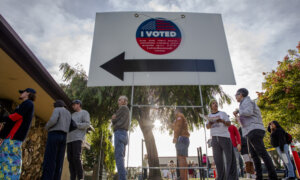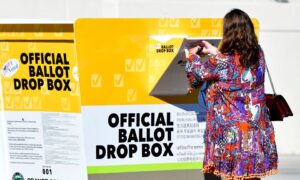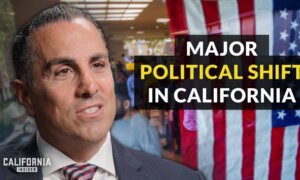California Gov. Gavin Newsom (D) has vetoed a bill expanding air monitoring provisions for fenceline communities on the perimeter of potentially high-polluting facilities around the state.
A fenceline community is any neighborhood at risk of high levels of pollution due to their location adjacent facilities such as oil refineries, chemical factories, industrial parks, or equivalent.
In an Aug. 19 statement announcing his stance on the Refinery Pollution Reduction and Transparency Act, Newsom said that California already has some of the “most stringent refinery air monitoring and pollution standards” of any jurisdiction in the world.
Under existing laws, California petroleum refinery owners are already required to have a fenceline monitoring system that meets requirements by the appropriate air quality management district, collect real-time data from those monitoring systems, and maintain records of the data.
“These standards have been developed and implemented by the state’s local air quality management districts, and each of these districts possess the authority and technical expertise to update, expand and modify these standards according to the best available science,” he said.
The bill, SB 674, which passed the Senate 28–8, with four abstaining, aimed to expand the air monitoring protocols for fenceline communities beyond petroleum refineries, to include those that produce biofuel and associated pollutants.
According to the bill analysis, groups in opposition to the expanded testing and requirements argue that refineries should only be responsible for monitoring and managing emissions from operations under their ownership and control. They also claim that forcing them to pay for any further upgrades beyond those already in place would “likely increase the cost of refining transportation fuel in California.”
Under the proposed legislation, affected facilities would have to maintain data collection records for at least five years, be subject to third-party audits, submit quarterly reports, and complete root cause analyses within 24 hours of any incident at the facility.
It would also require the release of a report to the public within 14 days on corrective actions that are being put in place to avoid similar incidents in the future. And facilities near fenceline zones would have to implement new, faster processes for notifying local communities about incidents, including when emissions exceed threshold levels.
Newsom says these measures are “highly prescriptive,” and to his knowledge, there is “no state funding identified or available in the state budget to support these efforts,” which might require state reimbursement of implementation costs.
“While I share the author’s desire to protect communities from air pollution, local air quality management districts are already carrying out the necessary action to do just that,” he said.
The health, civil rights, environmental, and equity organizations in support of expanded laws argue a statewide air monitoring standard to ensure that best practices are being used is the only solution to ensure transparency for people who live in high-risk or impacted areas.
The bill’s sponsor, State Senate Majority Leader Lena Gonzalez (D), called the veto by Newsom devastating.
In an Aug. 19 statement, Gonzalez said that while this was a setback for the cause, the communities will continue fighting for greater protections in the state.
“This is a devastating blow to the years of hard work and advocacy by communities affected by refinery air pollution,” she said.
“Fenceline communities urgently need improved air monitoring, and it shouldn’t be this difficult to establish a system that provides them with the most basic necessities—transparency and information about the toxic chemicals being released into their neighborhoods.”














